Sneaky uses for everyday things
You don’t have to be a secret agent to create and use unique gadgets. Anyone can learn a few simple tricks in minutes, using nothing but everyday items that are readily available.
Author Cy Tymony was a Boy Scout in Chicago, Ill., and he says he never forgot his Scout training in resourcefulness. Now, you can put his training to use. Just remember: Sometimes you have to be sneaky.
SLUSHY FUN: CHEAP GEL PACKS FOR SWOLLEN MUSCLES
After a long hike, a hard workout or a long game, your muscles might ache. When they do, an icy gel pack can relieve the pain and swelling. Gel packs work to reduce swelling because they can be fitted around joints to cool them thoroughly. Save money by making your own version—a slushy pack.
What You’ll Need:
• Water
• Rubbing alcohol
• Watertight freezer bag, typically 6-1⁄2 inches x 5-7⁄8 inches
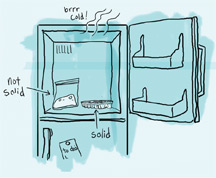
What You’ll Do:
Add 1-1⁄2 cups water and 1⁄2 cup rubbing alcohol to the plastic bag and seal it. Be sure the bag is not overfilled. Place the bag in the freezer for three hours. The fluid inside will not freeze solid. Instead, the alcohol keeps the water flexible and slushy. When needed, remove the bag from the freezer and apply it to the swollen area. To prevent frostbite or cold burns, place a towel or cloth between the plastic and the skin. Once you’re done, place the slushy pack back in the freezer for future use.
GOT A TOY CAR? MAKE A POWER DOOR OPENER
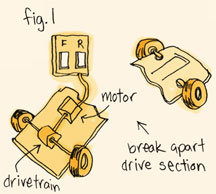 How cool would it be to have a power door opener as seen in science-fiction and spy movies? This project will show you how to use a toy car to do the trick. A small wire-controlled car has enough power to push and pull a typical room door back and forth if you know the super-sneaky way to install it.
How cool would it be to have a power door opener as seen in science-fiction and spy movies? This project will show you how to use a toy car to do the trick. A small wire-controlled car has enough power to push and pull a typical room door back and forth if you know the super-sneaky way to install it.
What You’ll Need:
• Wire-controlled toy car (not radio controlled, for better battery life)
• Velcro fastening tape, adhesive backed
• Screwdriver
• Pliers
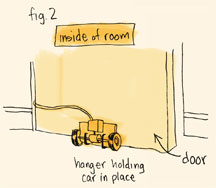 What You’ll Do:
What You’ll Do:
First, remove the body shell from the toy car with a screwdriver. Then remove the front wheel and axle.
Now, using the fastening tape, attach the car near the bottom end of the door. Using the remote control, see if it can push the door open or closed. If not, reposition the car for more traction. When you find the proper position, you will be able either to move the door with your hand or let the car do it.
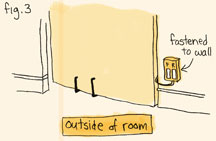 Optionally, you can break off the entire front part of the chassis so that it takes up less space and cover it with materials for a more appealing look. Mount the remote control as desired.
Optionally, you can break off the entire front part of the chassis so that it takes up less space and cover it with materials for a more appealing look. Mount the remote control as desired.
GAIN SNEAKY SEE-BEHIND VISION
Forget X-ray vision, heat vision and microscopic vision. In the real world, what counts is “see-behind” vision.
What You’ll Need:
• Small mirror or reflective material, about 1-1⁄2-inch square
• Duct tape
• Large paper clip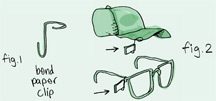
What You’ll Do:
Bend the large paper clip into the shape shown above and tape it tightly to the small mirror. If the edges of the mirror are sharp, tape them carefully. Then attach the mirror to a cap or eyeglasses with the other end of the clip. Note: To improve clarity, adjust the position of the mirror by bending the paper clip. You can use this sneaky vision device three ways: carry it in your hand, attach it to a cap or clip it to eyeglasses. Now you’re ready to use your see-behind vision for safety and fun.
SCIENCE FRICTION: FIVE FIRE-MAKING METHODS
Most experienced Scouts know how to start a fire without a lighter or matches. Do you? When lost in the wilderness, being able to make a fire can be a lifesaver, both to signal your location and to use for warmth and cooking. Here are five ways to start a small fire in an emergency.
Before you attempt to start a fire, you must have tinder and kindling materials available and understand how to use them. Many people fail to start fires even when they have good matches! A fire is built in stages. You first need to cause a small spark to ignite your tinder, small dry items like tissue paper, dead grass, twigs, leaves, lint or even paper money. Blow on the tinder carefully, so it stays lit and grows into a larger fire. Then carefully add kindling—sticks, branches or thick paper—to keep the fire going. Once the kindling is burning, you can add larger logs or other fuel.
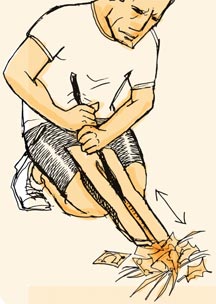 METHOD 1: MAKE A FIRE PLOW
METHOD 1: MAKE A FIRE PLOW
What You’ll Need:
• Hard stick with a blunted tip
• Flat piece of wood
• Tinder
• Kindling
• Knife or sharp-edged rock
What You’ll Do:
Using the knife or sharp rock, scratch a straight indentation in the center of the flat piece of wood about the same width as the blunt stick. Arrange the tinder so air can easily circulate, and set it at the foot of the piece of wood. Then, in a kneeling position, hold the flat piece of wood between your knees at an angle and move the stick rapidly back and forth in the indentation until friction ignites the fibers of tinder at the base. Mix in more tinder material and fan the smoke until a small fire starts. To keep the fire going, carefully add kindling material.
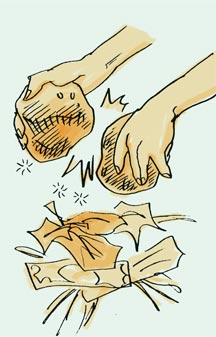 METHOD 2: SPARK GENERATION
METHOD 2: SPARK GENERATION
What You’ll Need:
• Knife or steel
• Sharp-edged rocks
• Tinder
• Kindling
What You’ll Do:
Use this method with very dry tinder material in a secluded, non-windy environment. Depending on what items are available, strike two rocks together to create a small spark close to tinder material. If a spark catches the tinder, you will see a glow. Carefully blow on it so it turns into a small flame. Fan the material until it starts to smoke and burn. If you have an item made of steel, like a knife, scrape it against various rocks until a spark appears.
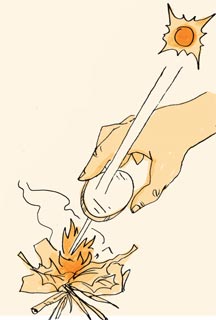 METHOD 3: MAKE FIRE WITH A LENS
METHOD 3: MAKE FIRE WITH A LENS
If it’s bright and sunny, it’s possible to use a lens to focus the heat of the sun on tinder material and start a fire.
What You’ll Need:
• Lens (from eyeglasses—reading glasses only, a magnifying glass, binoculars or telescope)
• Tinder
• Kindling
What You’ll Do:
With plenty of dry tinder available, aim the lens at it until it starts to smoke. Have other tinder material available to keep the fire going. When the tinder begins to burn, add kindling material.
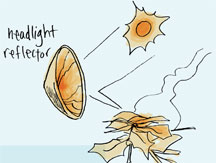 METHOD 4: MAKE FIRE WITH A REFLECTOR
METHOD 4: MAKE FIRE WITH A REFLECTOR
What You’ll Need:
• A reflector from a flashlight or headlight
• Tinder
• Kindling
What You’ll Do:
Position the tinder material in or in front of the reflector for maximum absorption of the sun’s rays. With plenty of sunshine available overhead, and a little luck, the tinder material will get hot enough to catch fire.
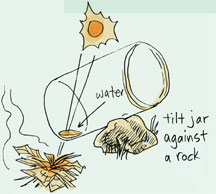 METHOD 5: MAKE FIRE WITH WATER
METHOD 5: MAKE FIRE WITH WATER
When positioned properly, water can act as a lens and focus enough of the sun’s heat to ignite tinder.
What You’ll Need:
• Water
• Jar or bottle
• Tinder
• Kindling
What You’ll Do:
Pour about two teaspoons of water into a clear jar or bottle. Tilt the jar so the water rests in a corner at the bottom and position it so the sun’s rays shine through the water onto the tinder and ignite it.
LOST? CRAFT A COMPASS
If you’re ever lost, you’ll find a compass is a crucial tool. When markers or trails are nonexistent, a compass can keep you pointed in the right direction to get you back to a line of reference. A compass indicates Earth’s magnetic north and south poles. This project describes three ways of making one with things around you. For each method, you will need:
• Needle (or twist-tie, staple, steel baling wire or paper clip)
• Small bowl, cup or other non-magnetic container
• Water
• Leaf or blade of grass
METHOD 1: MAGNET MAN
What You’ll Need:
• Small magnet from a radio or car stereo speaker
What You’ll Do:
Take the needle and stroke it in one direction with the small magnet, at least 50 times. This will magnetize the needle so it will be attracted to Earth’s north and south magnetic poles. Fill a bowl or cup with water. Place a small blade of grass or any small article that floats on the surface of the water. Place the needle on the blade of grass and watch it eventually turn in one direction. Mark one end of the needle so that magnetic north is determined.
METHOD 2: SILKY SMOOTH
What Else You’ll Need:
• Silk or synthetic fabric from a neckerchief, tie, scarf or other garment
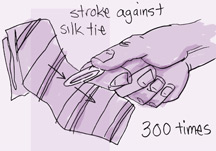 What You’ll Do:
What You’ll Do:
Stroke the needle in one direction with the silk material. This will create a static charge in the metal, but it will take many more strokes to magnetize it. Stroke at least 300 times. Once floated on a leaf in the bowl as in Method 1, the needle should be magnetized enough to be attracted to Earth’s north and south magnetic poles. You may have to remagnetize the sneaky compass needle occasionally.
METHOD 3: BATTERY POWER
What You’ll Need:
• Battery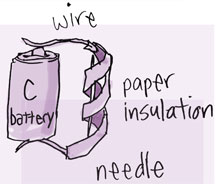
What You’ll Do:
When electricity flows through a wire, it creates a magnetic field. If a small piece of metal, like a staple, is placed in a coil of wire, it will become magnetized. Wrap a small length of wire around a staple or paper clip and connect its ends to a flashlight battery. If the wire is not insulated, wrap the staple with paper or a leaf and then wrap the wire around it. When you connect the wire to the battery in this manner, you are creating a short circuit — an electrical circuit with no current—draining load on it. This will cause the wire to heat quickly, so connect the wire ends to the battery only for short four-second intervals. Do this 15 times.
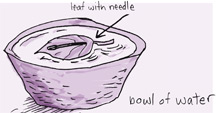 Place the staple on a floating item in a bowl of water, and it will eventually turn in one direction. Mark one end of the staple to determine magnetic north.
Place the staple on a floating item in a bowl of water, and it will eventually turn in one direction. Mark one end of the staple to determine magnetic north.
ROAD SCHOLAR: DOWN-TO-EARTH DIRECTION FINDING
If you’re stranded without a magnetic compass or the means to make one, all is not lost. Even without a compass, there are several ways to find directions in desolate areas. Here are two.
METHOD 1: USE A WATCH
The sun always rises in the east and sets in the west. Use this fact to find north and south with a watch.
What You’ll Need:
• Standard analog watch (with hands, not a digital watch)
• Clear day in which you can see the sun
What You’ll Do:
If you are in the Northern Hemisphere (north of the equator), point the hour hand of the watch in the direction of the sun. Midway between the hour hand and 12 o’clock will be south.
METHOD 2: USE THE STARS
What You’ll Need:
• A clear evening in which stars can be viewed
What You’ll Do:
In the Northern Hemisphere, locate the Big Dipper constellation. Follow the direction of the two stars that make up the front of the dipper to the North Star. (It is about four times the distance between the two stars that make up the front of the dipper.) Then follow the path of the North Star down to the ground. This direction is north.
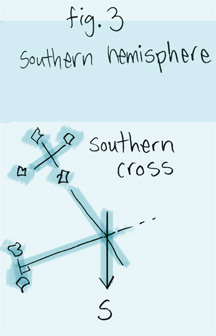 In the Southern Hemisphere, locate the Southern Cross constellation (see Figure 3). Notice the two stars below the cross. Imagine two lines extending at right angles, one from a point midway between the two stars and the other from the cross, to see where they intersect. Follow this path down to the ground. This direction is due south.
In the Southern Hemisphere, locate the Southern Cross constellation (see Figure 3). Notice the two stars below the cross. Imagine two lines extending at right angles, one from a point midway between the two stars and the other from the cross, to see where they intersect. Follow this path down to the ground. This direction is due south.
I owe this site my life I was lost in the woods with nothing but a laptop and a watch. I did not know what to do so I googled how to make a compass and found this site and was able to make one and later found my way out of the Canadian wilderness. Thank you so much.
I didnt know they had wi fi coverage in the woods… also, why not google earth your way out? -.-
awsome!!!!!!!! door opener rocks!!!!
very good, but i need the method to make fire by scratching steel on the magnet, what type of magnet is required to make the fire?
Who knew you could do that? I’m telling my patrol about this!
i like the homemade compass fun-fun-fun
this is cool im mean awesome
I really think your ideas are great!! Since, I play baseball,the gel packs are VERY helpful. Thanks.
I like the gel pack, auto door opener,fire starters and see behind vision
I will try them
the door opener was awesome, but it would be coolder make wireless and solar powered….no batteries!